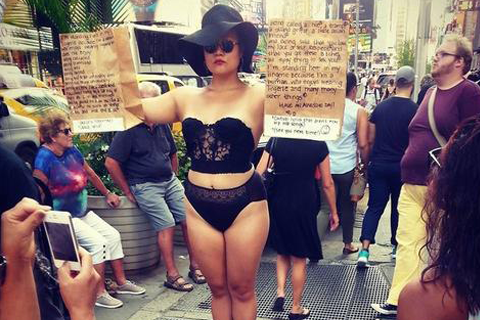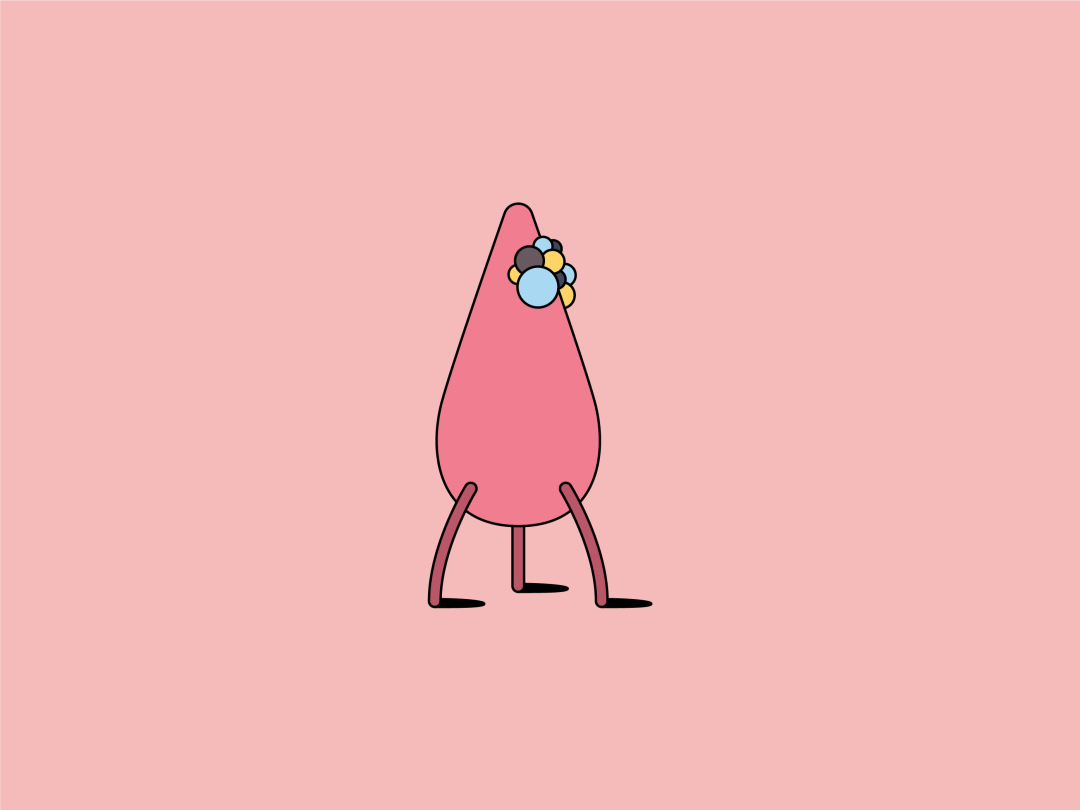UNDIE THE SURFACE: DIANA OH
thinx archive
·5 min read

by Team Thinx | 07/28/2016
Upon our first meeting with Diana Oh, it's clear that she would give you the shirt off her back or, more literally, her earrings. “I want you both to have these,” she said, presenting Emma and myself with matching dangling earrings in the shape of the word “Love.”
Wearing one of her "CATCALLING SUCKS" tee shirts, Diana approached us with a warm hug and ready to chat about her 9 part installation series called {{My Lingerie Play}}. We spoke with her before her final installation at Joe's Pub, which included original music and monologues. Oh preforms each part entirely in her lingerie, and while it's a major aspect, it is only one component of her dynamic and well-received series. Oh sat down with us to talk about her mission.
Kelsey Duchesne: What initially prompted you to create this installation?
Diana Oh: {{My Lingerie Play}} is a 9 part performance installation, with the focus of creating a saner smarter safer more respectful place for women to live. I came across an article done by an anonymous writer where she took a photo of her lingerie, and for each piece she wrote a description. I loved it, and I wanted to theatricalize that main idea. My medium is performance, it’s acting and singing and songwriting and putting on shows. I wanna put that on stage and use my own lingerie collections and I want to connect song and people and put a woman on stage in her lingerie being very human- it's not for arousal. Let's cut the shit! And real emotion happened- songs began to connect with the lingerie.
KD: What made you decide to make most of the performances open to the public?
DO: As I was writing , I threw my pen down and thought “Making all of these installations in-theater performances isn’t right. The same hundreds of people who come pay to see this show are people who know not to catcall and who know not to treat women poorly on the street--so who is this really for?
KD: That’s a great point.
DO: The people who I want to come to the theater won't be there- it’s not always affordable or inclusive. So I said “this isn't it- it needs to be a street installation, it needs to be out to the public. My roommate literally found a box--
KD: A literal soap box!
DO: Yes! I grabbed pens, paper bags, good, done, go. I wanted it to be entirely public- I went to the most public space you can think of, Time Square. If what we want to do is critique the system at play, we need to use the same tools they are using. People recorded it on their phones, cameras, and it was encouraged and completely okay with us. It was the most artistically freeing moment of my life, to perform my art and not try to control or theorize the responses.
KD: Did people follow you from installation to installation?
DO: Yeah! Once it went viral people started following it, my friends have been spreading the message, they want to support and be apart of the mission. With my last installation, I really want to drive home the message of “What drives a woman to take her clothes off in Times Square”? I want to express that I can't take it anymore. There is so much shame surrounding our bodies and what we are wearing. I didn't want to just list facts: I wanted to create a full sensory experience.
Emma Glassman-Hughes: You said you didn't want control, which to be is interesting because it's counter intuitive to my gut reaction of women in New York City not having control.
DO: What I meant was I do not want constraints of theater, to pander to an audience, worry ticket sales. This is information, how do you put a price tag on this? How can I stand here and perform this and say “these tools of empowerment are going to cost 30 dollars?” Obviously, in most cases, you need to charge for art, for performance, for underwear! But I wanted the price and performance to always be fair to the audience.
EGH: It opens up intersectionality as well, because not everybody can afford to go to the theater. Making most of your installations open to the public allows it to be an inclusive experience.
KD: In one of your installations, you stood on a box in Times Square for 24 hours. What was the reaction like?
DO: It was interesting. I performed in absolute silence and absorbed all of the reactions, which were mixed. I got told to my face “You're asking to be raped, that's how women get raped.” We had some incredible response too, but the bad was there with the good. It really put things in perspective. The hatred on the internet, I never realized how scary it was-- how people can say whatever they want without realizing that their words are so violent.
EGH: I feel like you almost want to say “I'm standing up here without clothes on, what more do you want from me? Isn’t this what you wanted when you catcalled me? And now it’s here and you tell me to have more decency?
DO: I find that our bodies are critiqued in ways that are unreal. I wear this shirt and people still catcall me? Like, how do you not get the memo? It happens less now, but I always think “Do you honestly think this is cute? I'm mad.” There was never a “Don't rape us” class. “Don't catcall” class. It was “Women, cover up your shoulders!” class. That was the lesson we grew up with. I want to remind people that these conversations need to be had.
EGH: What was the response like from other woman?
DO: Some women have said that I give them a bad name. A lot of women are raised with “If you're not covering up your body, you're asking to be raped.” But then there were women who were genuinely impacted and were incredibly moved.
KD: Have men been been active in your movement?
DO: A million percent! I worked with Safer NYC, and it's all inclusive. We agree that it's not about shaming men, it's about shaming people that act poorly! For me, because I recognize that the gender binary is bullshit, I don't need to be exclusive. We can all stand together and express together and be together. Its awesome having men support it because it's on them just as much as it is on us. Some guys i worked with had never approached these issues, and now they are totally immersed and passionate about it.
KD: That’s so wonderful. Whenever men make the “It doesn’t concern me” argument, I’m quick to remind them it does! Just because some things don't personally affect me doesn't mean i don't want to learn more about them.
Emma: What was your ideal reaction from this installation ? What do you want people to learn?
DO: I don't shame my body. I don't shame myself. Society does. Society has taught me to feel shame. It started when i was 16 and it continues on in my adult life. My hope is that if you come to my show and you've never been confronted before, maybe you think “Oh, it's not my fault!” or “What can i do to support non shaming female bodied people?” I want people to think about how to be a better human, to self love, to have love for other people. Here are the tools, so you can pinpoint what's going on, then go!
This article has been condensed and edited for clarity.
by Team Thinx


